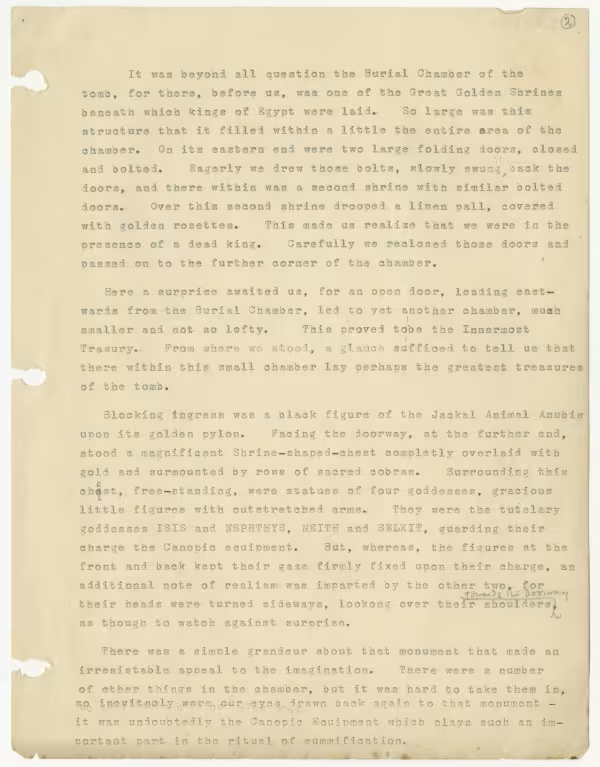TAA i.12.14

© Griffith Institute,
University of Oxford
(2)
It was beyond all question the Burial Chamber of the
tomb, for there, before us, was one of the Great Golden Shrines
beneath which kings of Egypt were laid. So large was this
structure that it filled within a little the entire area of the
chamber. On its eastern end were two large folding doors, closed
and bolted. Eagerly we drew those bolts, slowly swung <them> back the
doors, and there within was a second shrine with similar bolted
doors. Over this second shrine drooped a linen pall, covered
with golden rosettes. This made us realize that we were in the
presence of a dead king. Carefully we reclosed those doors and
passed on to the further corner of the chamber.
Here a surprise awaited us, for an open door, leading east-
wards from the Burial Chamber, led to yet another chamber, mus/<c>h
smaller and not so lofty. This proved to</>be the Innermost
Treasury. From where we stood, a glance sufficed to tell us that
there within this small chamber lay perhaps the greatest treasures
of the tomb.
Blocking ingress was a black figure of the Jackal Animal Anubis
upon its golden pylon. Facing the doorway, at the further end,
stood a magnificant Shrine-shaped-chest completlysic overlaid with
gold and surmounted by rows of sacred cobras. Surrounding this
cha/<e>st, free-standing, were statues of four goddesses, gracious
little figures with outstretched arms. They were the tutelary
goddesses ISIS and NEPHTHYS, NEITH and SELKIT, guarding their
charge the Canopic equipment. But, whereas, the figures at the
front and back kept their gaze firmly fixed upon their charge, an
additional note of realism was imparted by the other two, for
their heads were turned sideways, lookongsic over their shoulders <towards the doorway>,
as though to watch against surprise.
There was a simple grandeur about that monument that made an
irresistable appeal to the imagination. There were a number
of other things in the chamber, but it was hard to take them in,
so inevitably were our eyes drawn back again to that monument –
it was undoubtedly the Canopic Equipment which plays such an im-
portant part in the ritual of mummification.